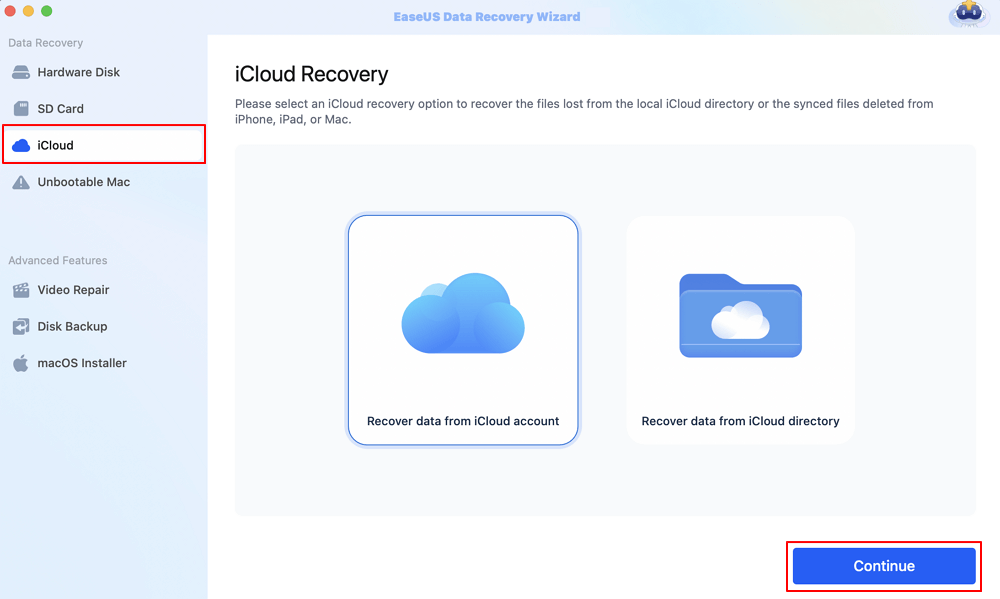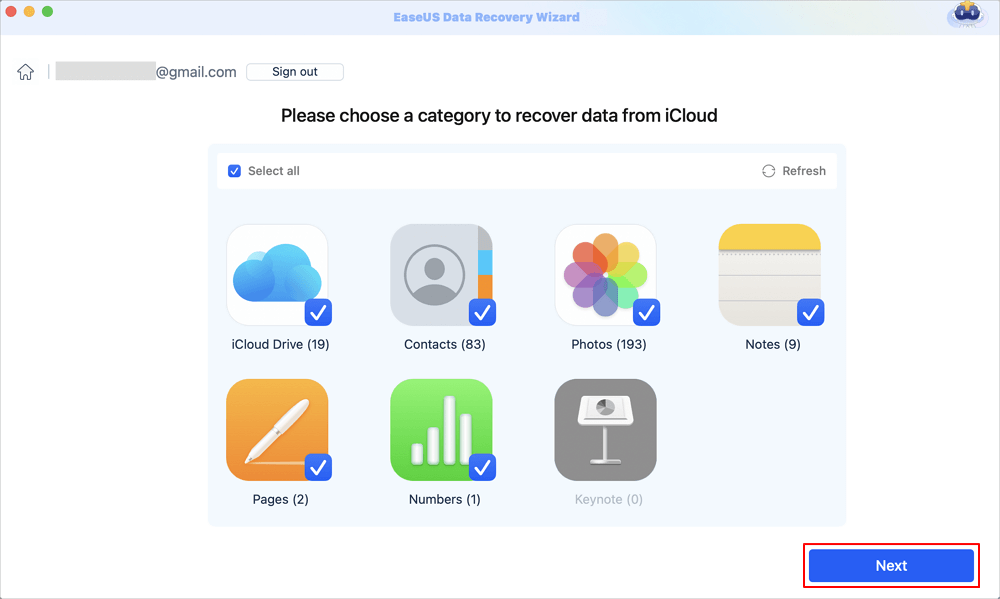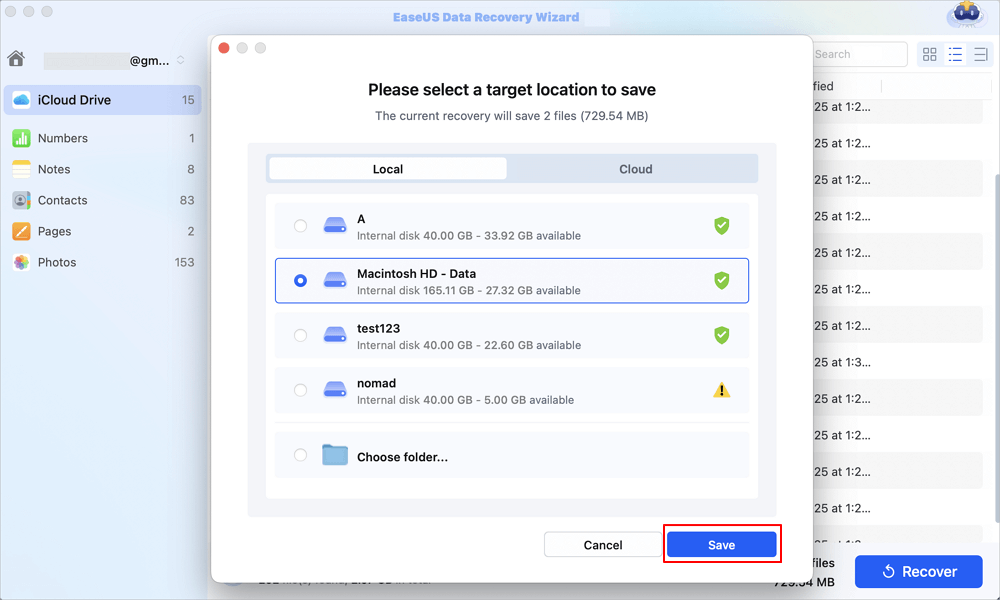Start Your Free Trial!
Sign up to our newsletter, stay updated on news and exclusive offers from EaseUS. Don't worry, if you change your mind, you can unsubscribe at any time, free of charge. We value your privacy (Privacy Policy).
Table of Contents
![]() About the Author
About the Author
![]() Reviews and Awards
Reviews and Awards
Have you mistakenly turned off iCloud Drive and lost documents? If you're now fretting about recovering the lost documents, you will be happy to know that you can retrieve those lost files from iCloud Drive without any hassle.
Regulating workflow, privacy, security, different cloud storage preferences, and restricted storage space are some of the major reasons people often turn off iCloud Drive. However, it's vital to understand that disabling iCloud Drive results in losing specific features and functionalities that depend on iCloud synchronization.
For the last few months, I have been unable to obtain more notifications because my iCloud has been out of storage. As I don't need iCloud, I have turned it off and abandoned my free 5GB. When I did that, I thought the file wouldn't be in iCloud, but I was shocked to see that all of the files on my PC were gone. I have become completely disheartened because I have been unable to restore it not in iCloud or the iCloud folder.
Therefore, the situation is common and might happen to any user. Any documents being synchronized to iCloud Drive will be erased if you stop keeping a copy when you shut down iCloud Drive on your Mac. If you have activated the feature in iCloud Drive, this also applies to documents kept in the Desktop and Documents folders. Most of your files and documents are usually found in these directories.
Turning on iCloud Drive on the Mac and preserving some folders and files in the desktop and document locations will upload them directly to iCloud without keeping them on the local disk unless you disable the "iCloud desktop & document folder" option in iCloud Drive.
It's possible that the data wasn't posted to the iCloud server before shutting down the iCloud drive if you're still having trouble on iCloud recovery. These must be recovered from the disk's short-term keeping place. When downloading and uploading from iCloud, every file from the iCloud Drive is kept in the short-term storage area on the disk: ~/Library/Mobile Document or ~/Library/iCloud Drive. In that case, you should use EaseUS Data Recovery Wizard for Mac to retrieve the lost iCloud files.
It is a professional data retrieval software for MacBooks that helps restore permanently deleted data from iCloud. The main features of this software are the following:
Step 1. Choose iCloud Recovery
Select the iCloud tab from the left list, choose the "Recover data from iCloud account" option to recover your iCloud Drive data, and click "Next" to log in to your iCloud account.

Step 2. Choose the "iCloud Drive" category
EaseUS software will quickly scan all the recoverable data from your iCloud account. Check the "iCloud Drive" category, and click the "Next" button.

Step 3. Recover iCloud Drive data from iCloud
Select the iCloud Drive data you want to restore, click the eye icon to preview the details, and then click the "Recover" button to get them back.

Step 4. Save recovered iCloud Drive data
Choose a safe storage location on your Mac hard drive to save the recovered iCloud Drive data. You can also save the recovered data to your cloud drives, such as DropBox, OneDrive, GoogleDrive, etc.

If you preserve a copy while disabling iCloud Drive on your MacBook, it will generate an iCloud Drive (Archive) folder to save every file from iCloud Drive. Nevertheless, it's crucial to note that the file will be in iCloud. You need to hover over to the iCloud.com website to access them sans having it enabled.
This procedure helps you retrieve data from iCloud Drive, whether the data has been deleted, lost, or eliminated. The steps are the following to use the restore function on iCloud:
Step 1. Launch any web browser, such as Safari or Chrome, from your MacBook and navigate to iCloud.com. Once you have entered your Apple password and ID, sign into your iCloud account by hitting the "arrow" symbol.
Step 2. Once you're on the iCloud homepage, hit "Account Settings."
Step 3. Click the"Restore Files" option underneath the "Advanced" section at the bottom of the page.

Step 4. You will see a new window where iCloud starts rummaging for the files preserved on the cloud. Give it a few seconds, and once the process has finished searching, you will see a broad list of the retrievable files that can be chosen according to your preference. Select the files you want to retrieve by ticking the boxes and hitting "Restore."
Step 5. iCloud will start the restoration process now. You must wait a few minutes if you have several files to restore. Once it's done, hit the "Done" button to exit the window and finish the process.
All the retrieved files & documents will quickly be available throughout your devices as long as they’re logged into a similar Apple account with iCloud turned on. Moreover, if you manually disable iCloud on your device prior, you won't be able to recover iCloud photos on Mac as they weren't backed up to the cloud.
If you liked the steps above, kindly share this information with your friends on social media.
Apple's cloud storage technology is incredibly convenient for users and operates brilliantly on Macs. Enabling every iCloud option means that whenever your device is powered on and linked to the internet, all your data—including contacts, images, files, and other data—gets synchronized and automatically stored in the cloud. However, if you have lost data unexpectedly because of turning off iCloud Drive, installing EaseUS Data Recovery Wizard for Mac would be better.
These are the FAQs to consider to understand the topic better:
Will I lose everything if I turn off iCloud Drive?
When you enable an app's iCloud, its data is securely saved in iCloud and immediately synced across your devices. When you disable the app, iCloud is no longer contacted, and your data is stored solely on your device.
Why are files disappearing from iCloud Drive?
Syncing is one of the most common issues caused by files disappearing from the iCloud drive. In that case, you must check if your device is appropriately linked to the internet and iCloud syncing is turned on. Other probable issues are deleted files, storage space, and settings alliterations.
How do I recover lost files from iCloud Drive?
Visit iCloud.com if you can't find the file you're trying to locate in the Recycle Bin or if you'd like to return the deleted file from a different device. Documents can be restored via Restore Files in the account settings or the Recently Deleted folder in iCloud Drive recovery
Why is iCloud deleting my files?
The main reason for iCloud deleting your files is that when you turn on the “Desktop & Documents Folders” option to sync with iCloud, your MacBook was set up to improve storage. This feature assists you in saving space on your Mac by storing the most recently accessed files locally while other files are kept in iCloud.
Was This Page Helpful?
Jaden is one of the editors of EaseUS, who focuses on topics concerning PCs and Mac data recovery. Jaden is committed to enhancing professional IT knowledge and writing abilities. She is always keen on new and intelligent products.
EaseUS Data Recovery Wizard Pro has a reputation as one of the best data recovery software programs on the market. It comes with a selection of advanced features, including partition recovery, formatted drive restoration, and corrupted file repair.
Read MoreEaseUS Data Recovery Wizard is a powerful system recovery software, designed to enable you to recover files you’ve deleted accidentally, potentially lost to malware or an entire hard drive partition.
Read MoreEaseUS Data Recovery Wizard is the best we have seen. It's far from perfect, partly because today's advanced disk technology makes data-recovery more difficult than it was with the simpler technology of the past.
Read MoreEaseUS Data Recovery Wizard Pro has a reputation as one of the best data recovery software programs on the market. It comes with a selection of advanced features, including partition recovery, formatted drive restoration, and corrupted file repair.
Read MoreEaseUS Data Recovery Wizard is a powerful system recovery software, designed to enable you to recover files you’ve deleted accidentally, potentially lost to malware or an entire hard drive partition.
Read MoreRelated Articles
Is Disk Drill Safe to Use on Mac? Is Disk Drill Legitimate Software or Hack
![]() Jean/Nov 27, 2024
Jean/Nov 27, 2024
6 Best Ways to Restore Disappeared Desktop on Mac [Step-by-Step Tutorial]
![]() Brithny/Nov 27, 2024
Brithny/Nov 27, 2024
Why Can't I Open My Icloud Files and How to Fix
![]() Finley/Feb 14, 2025
Finley/Feb 14, 2025
How to Fix Time Machine Backup Error 19 With Nas
![]() Jaden/Nov 27, 2024
Jaden/Nov 27, 2024
CHOOSE YOUR REGION
Start Your Free Trial!
Sign up to our newsletter, stay updated on news and exclusive offers from EaseUS. Don't worry, if you change your mind, you can unsubscribe at any time, free of charge. We value your privacy (Privacy Policy).
Start Your Free Trial!
Sign up to our newsletter, stay updated on news and exclusive offers from EaseUS. Don't worry, if you change your mind, you can unsubscribe at any time, free of charge. We value your privacy (Privacy Policy).